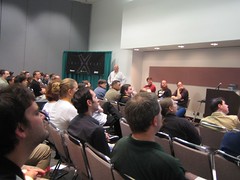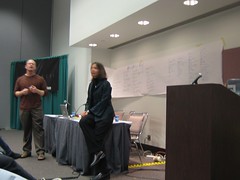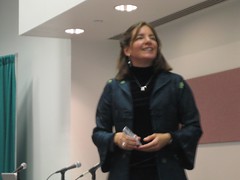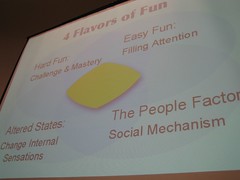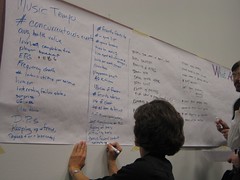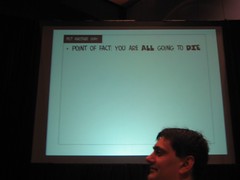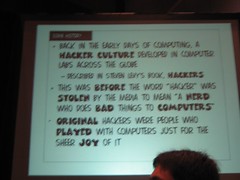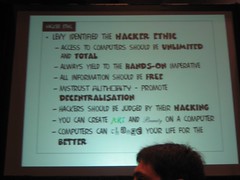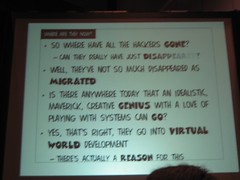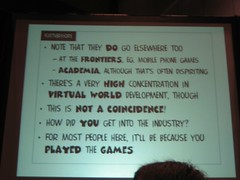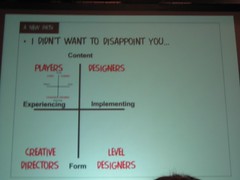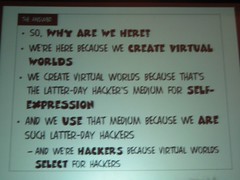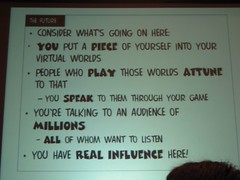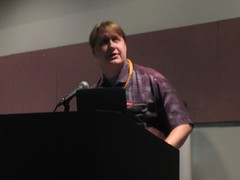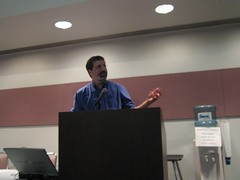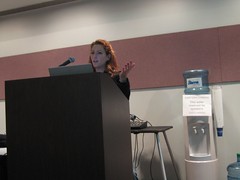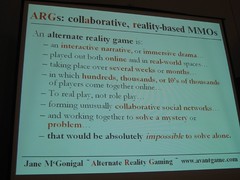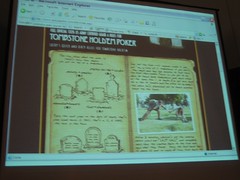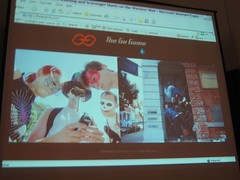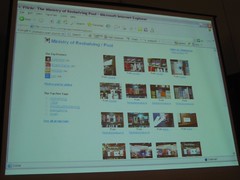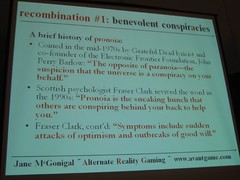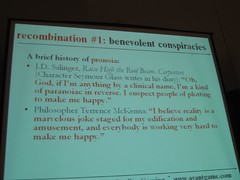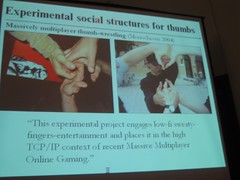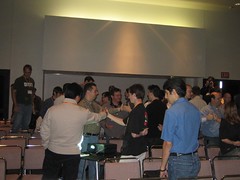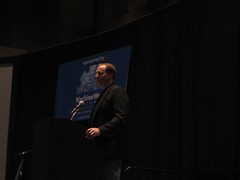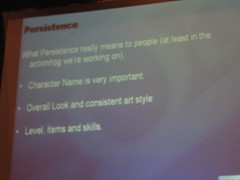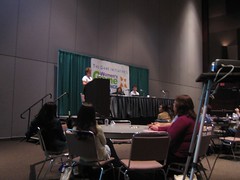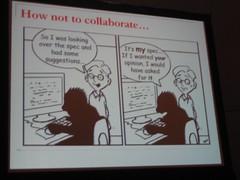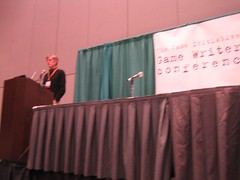27 October 2005, Texas, Austin, Austin Game Conference
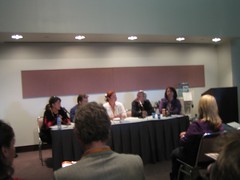
Panel starts out with a cooperative trashing of conversation trees.
Carly Staehlin, Michael Sellers, Patricia Pizer, Lee Sheldon, Sheri Graner Ray
Why do we need NPC:s. Why are they so boring.
Sellers: They are props. Explanation over their head... Why we need better NPCs
NPCs that you can have an emotional attachment to. That remember who you are. Not being talking furniture.
Moderator: continues trashing conversation trees, but in more detail. She would rather make an interface. ...conversation with senile grandmother...
Patricia: infocom games. Parser was a big part of the game. Gaming to make it clever in response. Help develop the parser, making it more intelligent. First days at infocom... Guy saying "so good you dont even know it is there. Holy grail of interface design: that players not even notice the interface since they are so caought up with playing the game. All sorts of vehicles for this... Running across a book, a stone with an inscription, opprotrunities for getting information accross. Use npcs effectively if we can find other ways of generating the story, to get the info across. But some pieces need to have a human attached to them. A reason for having a relationship to them.
Sheldon: for avoiding exposition, move npcs around a bit. Maybe an NPC is upset and cant talk to you at the moment, but it can sell you something. And bartenders never give good advice anyway last one said give this panel. Invest effort in the npcs, they need to be part of the fabric of the world.
Sellers: npcs are objects in the world. They are objects, could be vending mashines. If you look at them as objects but personify them. Key is caring about the person. Why are they upset. Want so find out something new. Get a persons sotry to unfold. Events in their lives. Objectified characters.
Graner: Playerbase uncomfortable if npcs are not there. Having npcs there that dont do much in swg, but they are there so that it doesnt feel that empty. Wending mashines and wallpaper.
Panel: butterfiels or wallpaper?
Staehlin asks audience about what would be good for npcs.
Woman in audience: more intelligent answers in combat situation
Man in audience: more meaningful quests
Man in audience: npcs need to have purpose. What separates them from furniture? Npcs grow and die.
Staehlin: purpose in life.
Sheldon: put in an npc, a village priest that was going to die. Made him likable, helpful with sence of humpr. Plan to kill him off in 9 monts (but game was stalled)
1st woman in audience clarifying her point.
Graner Ray: need to proof against griefing in the case when npcs have highly variable behavior responses.
Pizer: what about helping out in the street if someone is being beat up. Told a story with the point that the real world is seldom what we expect, so when designing games its only a belief of imitating the world when it comes to human behavior.
Sellers. Npcs doesnt care about my corpse. Having npcs understanding contexts would be good.
Pizer: AI. Lot of things that can and should be done.
Staehlin: reminding of the nuance of pathfinding
Sellers: what if npcs had badges showing what clans they are in...
/*but swg has that*/
Graner Ray: we do that a bit. Also changes from different planets. Likelyhood of being attacked by certain groups of npcs, npcs selling items to higher prices to certain players.
Imortant for players to know who is in charge of the planet, imperials or rebels.
Sellers: once npcs are talking to each other... See styles... Adopting clothing styles of npcs (?)
Staehling: where do we want to go? Is text the problem, would voice make it better.
Sheldon: shouldnt matter. A text crafted with skill and grace is just as good as voice
Sellers: for getting empathy... Not all how they are saying it... What they are sying is important...
Sheldon: wierd if players are so set apart, since they need to type the text.
Pizer: conversation trees... Expensive to do the voicing...
Graner: plus its difficult to change afterwards compared to text.
Sheldon: charles dickens... Cant have same granularity on everything. How fleshed out objects are depends on their importance.
Graner: voice can be used as a reward. Effective. (omg this guy is talking to me, he didnt do that before)
/*did darth vader speak in swg after i completed the quest? Cant remember*/
Staehling: storytelling and mmo???
Sheldon: problem: presentation. When players want to go on to the next quest they are given a whole page of text to read on the screen what the hell ppl dont want to do that.
Sellers: community is about relationships... Conversation must feel more real. Split up in relational chunks. This person done me wrong... A task involved... Bing, story!
Staehling: investement in doing the npcs... If its possible to create npcs that people feel amotional attachment to... Is it dangerous?
Graner: not more dangerous than in other media. We need to look at starting developing emotions... Reach audience that hasnt been tapped yet... We do that through real emotion.
Sheldon: be careful with love and sex... Already in trouble w Guns!
Sellers: simulation.... We had 2 characters early on, slight miscalulation: iiik a 3rd person! A character that is habitually sad, makes a player sad too. Open question: movie, dramatic sequence, character dies... Cathartic experience. Can it be the same in a game?
Staehling: What about hiring actors instead of programming AI:s? Example from ulima online, Lord British. Prblematic to deal with swince so many didnt get to see him.
Pizer
Scale of the lily.
Asherons Call... Working on little game appearances in the game. Incredibly stressful to do it live. Many ppl to deal with. Anything can happen. Beautiful idea, and terribly scare.
Sheldon: URU. No return on investment that will make this work. Great moment around kitchen table, but it doesnt scale, and the voice actors my god, so many better ways of doing it.
Man in audience diagreeing on last point: can be useful with having real actors such as in asheron. There is a game out there were one can get a real interaction like that.
/*what here is it that he is _not_ saying? */
Man in audience: reason for making the npcs so simple is also to make scalability possible.
Easier to make incremental solutions in that case.
Man in audience> referring to game where gameplay consits of talking to one npc and see changes in emotional state.
Asking/presenting idea about having persistent npcs that keep recurring for individual players.
Sheldon: it has been done! But not in mmos.
Graner: we are talking about thousands of players here. Whish one could have that.
Sheldon playing devils advokate: what if players just think it slows them down. Wants their items etc?
